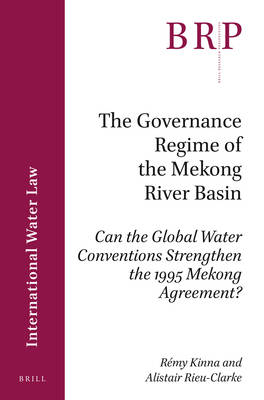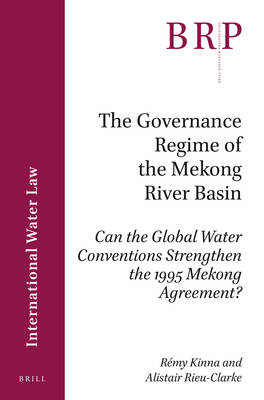
- Afhalen na 1 uur in een winkel met voorraad
- Gratis thuislevering in België vanaf € 30
- Ruim aanbod met 7 miljoen producten
- Afhalen na 1 uur in een winkel met voorraad
- Gratis thuislevering in België vanaf € 30
- Ruim aanbod met 7 miljoen producten
Zoeken
The Governance Regime of the Mekong River Basin
Can the Global Water Conventions Strengthen the 1995 Mekong Agreement?
Rémy Kinna, Alistair Rieu-Clarke
€ 128,45
+ 256 punten
Omschrijving
Entry into force of the UN Watercourses Convention in August 2014, and the opening of the UNECE Water Convention to all states in March 2016, are significant milestones in international water law. A comparative analysis of these two global water conventions and the 1995 Mekong Agreement reveals that all three instruments are generally compatible. Nonetheless, the international legal principles and processes set forth in the two conventions can render the Mekong Agreement more up-to-date, robust and practical.
The Governance Regime of the Mekong River Basin: Can the Global Water Conventions Strengthen the 1995 Mekong Agreement? contends that strengthening the Agreement would be timely, given the increasing pressures associated with the rapid hydropower development within the basin and the gradually emerging disputes therein. Due to these fast-moving developments, Kinna and Rieu-Clarke strongly recommend that the Mekong states should seriously consider joining both conventions in order to buttress and clarify key provisions of the 1995 Mekong Agreement.
The Governance Regime of the Mekong River Basin: Can the Global Water Conventions Strengthen the 1995 Mekong Agreement? contends that strengthening the Agreement would be timely, given the increasing pressures associated with the rapid hydropower development within the basin and the gradually emerging disputes therein. Due to these fast-moving developments, Kinna and Rieu-Clarke strongly recommend that the Mekong states should seriously consider joining both conventions in order to buttress and clarify key provisions of the 1995 Mekong Agreement.
Specificaties
Betrokkenen
- Auteur(s):
- Uitgeverij:
Inhoud
- Aantal bladzijden:
- 92
- Taal:
- Engels
- Reeks:
Eigenschappen
- Productcode (EAN):
- 9789004345690
- Verschijningsdatum:
- 25/05/2017
- Uitvoering:
- Paperback
- Formaat:
- Trade paperback (VS)
- Afmetingen:
- 152 mm x 231 mm
- Gewicht:
- 45 g

Alleen bij Standaard Boekhandel
+ 256 punten op je klantenkaart van Standaard Boekhandel
Beoordelingen
We publiceren alleen reviews die voldoen aan de voorwaarden voor reviews. Bekijk onze voorwaarden voor reviews.











